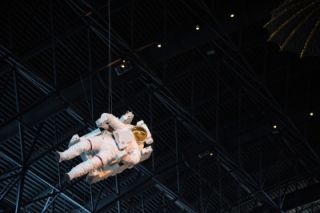Loneliness
The Martian Totally Neglects the Behavioral Sciences
How guilt and loneliness were mishandled in the film
Posted October 13, 2015
The box-office smash The Martian is getting widely praised for being an extremely entertaining, crowd-pleasing movie (it is) that gets the science right. But while the film gets the space science, astrophysics, botany, chemistry, and engineering right—it gets the psychology very wrong.

Astronaut Mark Watney finds himself stranded on Mars after his crew assumed he had been killed during a dust-storm that forced them to terminate the first manned mission to the red planet and return to Earth. After struggling to survive for two months, Watney finally makes contact with NASA and we are introduced to administrators, mission specialists, a public relations person and scientists from many different disciplines.
But there isn’t a psychologist in sight.
The head of NASA decides not to tell the returning crew (who are still on their long journey home) that Watney is alive because he doesn't want them to be distracted from their tasks. His argument would be far more compelling if the majority of their scenes didn’t show them idly passing the time until their space craft reaches Earth and if he had consulted a psychologist about the psychological and emotional ramifications of this decision for the crew or for Mark Watney.
But he didn't.
When the crew eventually discovers they had inadvertently abandoned Watney on Mars and had been lied to about it, they have emotional reactions that range from anger to guilt (read 10 Things You Didn't Know about Guilt), both of which are known to impact judgment and decision making. What do the psychologists at NASA recommend to help the crew deal with these emotions so they don’t impair their thinking and decision making at a critical time?
Nothing. No one asked them.
Watney ends up spending almost two years alone on Mars before a rescue attempt is made to bring him home. His loneliness must be profound, something he even alludes to himself. Loneliness has a significant and immediate reaction on our psychological functioning as well as on our physical health, as it suppresses the function of our immune system (read 10 Surprising Facts about Loneliness). A behavioral scientist would have easily sounded the alarm and pointed out the scientific approaches they could have taken to alleviate Watney’s loneliness—but there isn’t a single behavioral scientist on (or off) the screen during the entire film—not one.
Although not produced by NASA, The Martian certainly had NASA's cooperation and support. It is a shame that neither NASA nor the filmmakers considered the emotional and behavioral challenges astronauts would clearly face on any long duration mission to Mars, not to mention the scenarios depicted in the film.
Much like crew of Ares 3 did to Mark Watney, The Martian abandoned the behavioral sciences and blasted off without them. Let’s hope NASA avoids the same mistake when a real mission to Mars takes place.
To learn more about the impact of guilt and loneliness and how science is finding treatments for these emotional states, check out the chapters on rejection, self-esteem and loneliness in Emotional First Aid: Healing Rejection, Guilt, Failure and Other Everyday Hurts (Plume, 2014).
Watch my TED Talk and learn how to boost your emotional strength.
Like The Squeaky Wheel Blog Facebook Page, post questions or comments about this article and I will answer them.
Also, join my email list and receive an exclusive gift article—How to Recover from Rejection.
Visit my website at guywinch.com and follow me on Twitter @GuyWinch
Copyright 2015 Guy Winch
Images by freedigitalphotos.net


